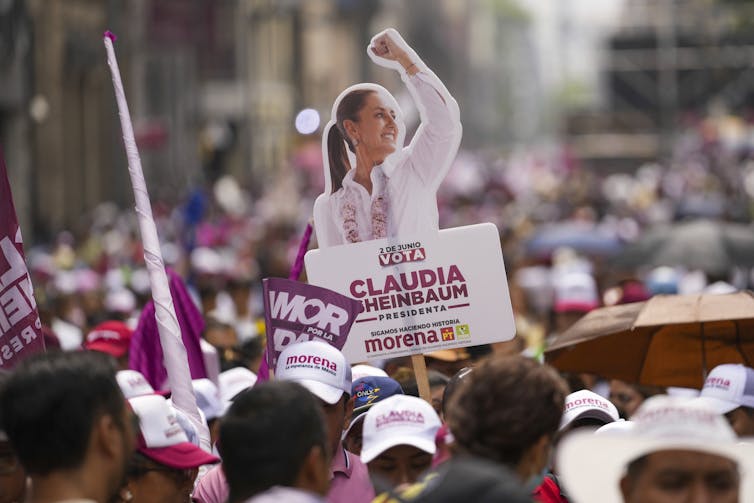Mexicans will go to the polls on June 2, 2024, to pick a president following an election campaign marred by violence and divisive political rhetoric.
Polls suggest that ruling party candidate Claudia Sheinbaum will win, holding off rival Xóchitl Gálvez, who heads up a left-right coalition.
Unpredictability over the size of the turnout may remain a factor, but barring any major shocks, Mexico will have its first woman president when all the votes are counted.
Scholars writing for The Conversation U.S. have discussed what this gender landmark will mean for Mexico, among other issues. Here are three stories that explore the significance of the 2024 Mexican election.
1. Toward gender equality?
Much has been made of the fact that Mexico is about to elect a female president. But does that reflect real gender equality in the country’s politics? Xavier Medina Vidal and Christopher Chambers-Ju, scholars of Mexican politics and gender at the University of Texas at Arlington, tackle that question.
They note that while women already make up half of Mexico’s Congress and are in top political and judicial posts, that tells only part of the story.
“Electing women to high office doesn’t necessarily shift power in meaningful ways. It’s what experts on women in politics call ‘descriptive representation’ – when political leaders resemble a group of voters but fail to set policies designed to protect them,” they write. One main concern is the level of violence and harassment of women in Mexico, both those in the public eye and everyday citizens. Femicide rates in Mexico remain shockingly high, with 10 women and girls killed every day.
“Women may be gaining political power in Mexico, but the question now is whether they’ll use it to fight for the women they represent,” Medina Vidal and Chambers-Ju conclude.
2. A deadly electoral cycle
The 2024 election will be a landmark one for Mexico in another way: campaign violence. As Amalendu Misra, a professor of international politics at Lancaster University, notes, the election season – in which voters are also deciding thousands of local, state and congressional positions – is on course to be the deadliest on record.
“Violence against Mexican politicians is common,” he writes. “But the country’s powerful organized gangs step up political violence during election season as they look to ensure compliance from incoming candidates and secure business opportunities.”
Complicating matters further is the fragmentation of the country’s gangs in recent years, with cartels splitting up into separate branches. “Simply put, the ongoing violence against politicians and political candidates in Mexico reflects the struggle for territorial consolidation and lucrative business opportunities among various organized criminal gangs,” Misra notes.
Indeed, at least 36 candidates have been slain during the current electoral cycle.
Read more: Mexico's criminal gangs stir up political violence ahead of election season

3. The state of democracy
Mexico, of course, is not alone among Latin American nations in having gang violence interfere with the political process.
How has that affected the way people in the region think about democracy? Luke Plutowski, Elizabeth J. Zechmeister and Noam Lupu at Vanderbilt University’s LAPOP Lab have some answers.
Their latest AmericasBarometer, which every two years surveys the attitudes of people across the Western Hemisphere, finds that widespread pessimism over poverty and violence is affecting the way people in Latin America view democracy.
“Our results show that disillusionment with the democratic status quo is strikingly high in the region, with only 40% thinking democracy is working,” they note.
But despite this downcast assessment, support for the idea of democracy remains high. Across the region, 58% of people say democracy is the best form of governance. In Mexico, that figure is higher at 62%.
“For now, at least, an enduring belief in democracy may facilitate efforts by leaders in and outside the region to champion and strengthen democratic governance,” Plutowski, Zechmeister and Lupu conclude.

